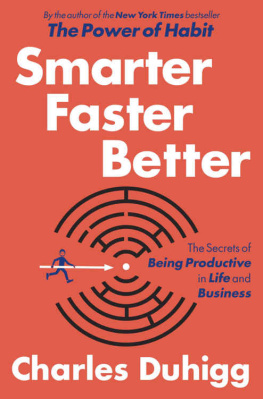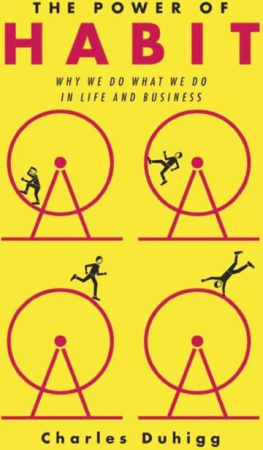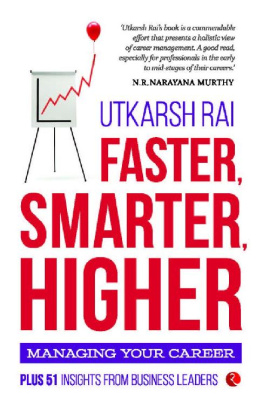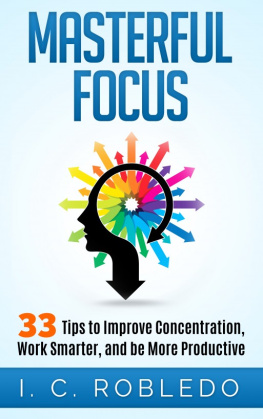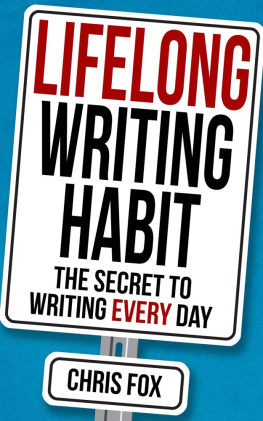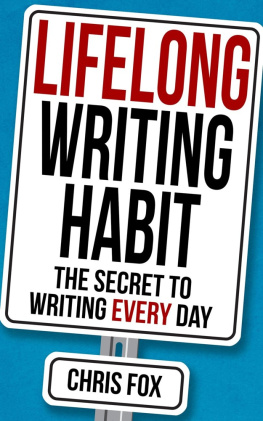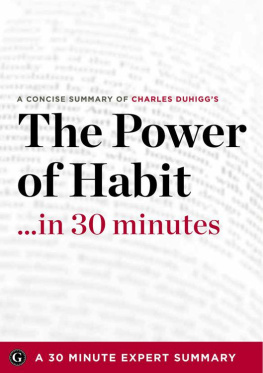Charles Duhigg - Smarter Faster Better: The Secrets of Being Productive in Life and Business
Here you can read online Charles Duhigg - Smarter Faster Better: The Secrets of Being Productive in Life and Business full text of the book (entire story) in english for free. Download pdf and epub, get meaning, cover and reviews about this ebook. year: 2016, publisher: Random House, genre: Detective and thriller. Description of the work, (preface) as well as reviews are available. Best literature library LitArk.com created for fans of good reading and offers a wide selection of genres:
Romance novel
Science fiction
Adventure
Detective
Science
History
Home and family
Prose
Art
Politics
Computer
Non-fiction
Religion
Business
Children
Humor
Choose a favorite category and find really read worthwhile books. Enjoy immersion in the world of imagination, feel the emotions of the characters or learn something new for yourself, make an fascinating discovery.
- Book:Smarter Faster Better: The Secrets of Being Productive in Life and Business
- Author:
- Publisher:Random House
- Genre:
- Year:2016
- Rating:3 / 5
- Favourites:Add to favourites
- Your mark:
Smarter Faster Better: The Secrets of Being Productive in Life and Business: summary, description and annotation
We offer to read an annotation, description, summary or preface (depends on what the author of the book "Smarter Faster Better: The Secrets of Being Productive in Life and Business" wrote himself). If you haven't found the necessary information about the book — write in the comments, we will try to find it.
At the core of Smarter Faster Better are eight key conceptsfrom motivation and goal setting to focus and decision makingthat explain why some people and companies get so much done. Drawing on the latest findings in neuroscience, psychology, and behavioral economicsas well as the experiences of CEOs, educational reformers, four-star generals, FBI agents, airplane pilots, and Broadway songwritersthis painstakingly researched book explains that the most productive people, companies, and organizations dont merely act differently.
They view the world, and their choices, in profoundly different ways.
A young woman drops out of a PhD program and starts playing poker. By training herself to envision contradictory futures, she learns to anticipate her opponents misstepsand becomes one of the most successful players in the world.
A group of data scientists at Google embark on a four-year study of how the best teams function, and find that how a group interacts is more important than who is in the groupa principle, it turns out, that also helps explain why Saturday Night Live became a hit.
A Marine Corps general, faced with low morale among recruits, reimagines boot campand discovers that instilling a bias toward action can turn even the most directionless teenagers into self-motivating achievers.
The filmmakers behind Disneys Frozen are nearly out of time and on the brink of catastropheuntil they shake up their team in just the right way, spurring a creative breakthrough that leads to one of the highest-grossing movies of all time.
What do these people have in common?
They know that productivity relies on making certain choices. The way we frame our daily decisions; the big ambitions we embrace and the easy goals we ignore; the cultures we establish as leaders to drive innovation; the way we interact with data: These are the things that separate the merely busy from the genuinely productive.
In The Power of Habit, Pulitzer Prizewinning journalist Charles Duhigg explained why we do what we do. In Smarter Faster Better, he applies the same relentless curiosity, deep reporting, and rich storytelling to explain how we can improve at the things we do. Its a groundbreaking exploration of the science of productivity, one that can help anyone learn to succeed with less stress and struggle, and to get more done without sacrificing what we care about mostto become smarter, faster, and better at everything we do.
Advance praise for Smarter Faster Better
As he did in The Power of Habit, Duhigg melds cutting-edge science, deep reporting, and wide-ranging stories to give us a fuller, more human way of thinking about how productivity actually happens.Susan Cain, author of Quiet
Duhigg uses engaging storytelling to highlight fascinating research and core principles that we can all learn and use in our daily lives. A masterful must-read for anyone who wants to get more (and more creative) stuff done.David Allen, author of Getting Things Done
Duhigg has a gift for asking just the right question, and then igniting the same curiosity in the rest of us. In Smarter Faster Better he finds provocative answers to a riddle of our age.Jim Collins, author of Good to Great
Charles Duhigg: author's other books
Who wrote Smarter Faster Better: The Secrets of Being Productive in Life and Business? Find out the surname, the name of the author of the book and a list of all author's works by series.

